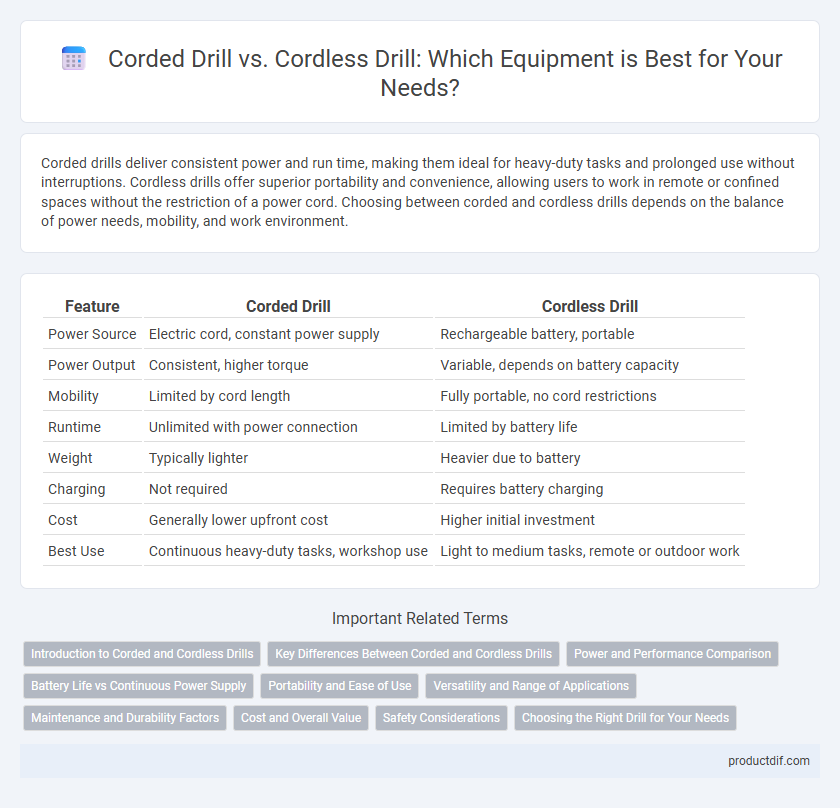Corded drills deliver consistent power and run time, making them ideal for heavy-duty tasks and prolonged use without interruptions. Cordless drills offer superior portability and convenience, allowing users to work in remote or confined spaces without the restriction of a power cord. Choosing between corded and cordless drills depends on the balance of power needs, mobility, and work environment.
Table of Comparison
| Feature | Corded Drill | Cordless Drill |
|---|---|---|
| Power Source | Electric cord, constant power supply | Rechargeable battery, portable |
| Power Output | Consistent, higher torque | Variable, depends on battery capacity |
| Mobility | Limited by cord length | Fully portable, no cord restrictions |
| Runtime | Unlimited with power connection | Limited by battery life |
| Weight | Typically lighter | Heavier due to battery |
| Charging | Not required | Requires battery charging |
| Cost | Generally lower upfront cost | Higher initial investment |
| Best Use | Continuous heavy-duty tasks, workshop use | Light to medium tasks, remote or outdoor work |
Introduction to Corded and Cordless Drills
Corded drills provide continuous power through an electrical outlet, ensuring consistent torque and higher runtime for demanding tasks. Cordless drills offer enhanced mobility and convenience, powered by rechargeable lithium-ion batteries that deliver variable speed control for versatile applications. Both types differ in power source and portability, making selection dependent on job requirements and work environment.
Key Differences Between Corded and Cordless Drills
Corded drills offer consistent power and unlimited runtime by connecting directly to an electrical outlet, making them ideal for heavy-duty tasks and continuous use. Cordless drills provide greater portability and convenience with rechargeable batteries, allowing easy maneuverability in areas without access to power sources. Battery life, torque, weight, and ease of use are critical factors differentiating corded and cordless drills for various drilling and fastening applications.
Power and Performance Comparison
Corded drills deliver consistent high power through direct electrical connection, enabling sustained performance for heavy-duty tasks without the risk of battery depletion. Cordless drills offer greater portability and convenience but may experience performance drops as battery charge decreases, limiting continuous operation time. For intensive drilling requiring maximum torque and uninterrupted power, corded drills typically outperform cordless models.
Battery Life vs Continuous Power Supply
Corded drills provide a continuous power supply, ensuring consistent performance during extended tasks without the need for recharging. Cordless drills rely on battery life, which limits usage time and requires periodic recharging, but offers greater mobility on job sites without access to power outlets. Battery technology advancements, such as lithium-ion batteries, have improved cordless drill runtimes but still cannot match the unlimited operating time of corded models.
Portability and Ease of Use
Cordless drills offer superior portability due to their battery-powered design, eliminating the need for a power outlet and allowing unrestricted movement on job sites. Corded drills provide continuous power, but their reliance on cables limits mobility and can complicate access to tight spaces. Ease of use favors cordless models because their lightweight and compact structure reduces user fatigue during extended use.
Versatility and Range of Applications
Corded drills deliver consistent power ideal for heavy-duty tasks and prolonged use, making them suitable for construction, metalwork, and masonry applications. Cordless drills offer superior portability and flexibility, enabling users to work in remote or confined spaces without access to power outlets. The choice between corded and cordless drills hinges on balancing the need for uninterrupted power against the convenience of mobility for versatile project demands.
Maintenance and Durability Factors
Corded drills require less maintenance due to their simpler design and constant power supply, reducing wear on internal components compared to cordless drills. Cordless drills depend heavily on battery health and charging cycles, which can degrade over time and impact tool longevity. Durability of corded drills often surpasses cordless models because they lack delicate battery packs and electronic controls prone to damage.
Cost and Overall Value
Corded drills typically cost less upfront and offer continuous power without battery replacement expenses, making them a budget-friendly option for heavy-duty tasks. Cordless drills provide greater portability and convenience, but their higher initial price and battery maintenance can increase long-term costs. Evaluating overall value depends on the frequency of use, with corded drills favored for prolonged projects and cordless drills ideal for versatile, on-the-go applications.
Safety Considerations
Corded drills provide a consistent power supply, reducing the risk of sudden power loss that could cause accidents, but their cords pose tripping hazards and require careful management around the work area. Cordless drills enhance maneuverability and reduce trip risks, yet battery maintenance is crucial to prevent overheating or leakage, which can compromise safety. Selecting between corded and cordless drills depends on balancing power reliability with mobility and ensuring proper safety protocols are followed for each type.
Choosing the Right Drill for Your Needs
Corded drills provide consistent power and are ideal for heavy-duty tasks requiring prolonged use, while cordless drills offer portability and convenience for quick jobs and access to tight spaces. Battery life and torque specifications are critical factors when selecting a cordless drill, whereas corded models emphasize sustained output and amperage. Evaluating the frequency, environment, and intensity of your drilling projects ensures the right drill matches your specific equipment needs.
Corded drill vs Cordless drill Infographic

 productdif.com
productdif.com